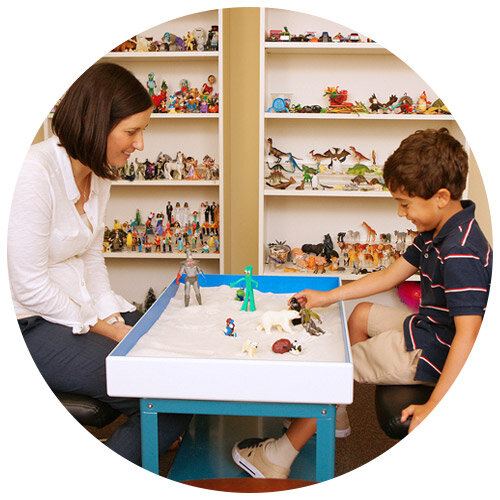I help your child using proven play therapy techniques deal with life’s challenges like anxiety, depression, divorce, bullying, trauma, and a variety of other issues children face today.
Play Therapy and Sand Tray Therapy in baldwin park, FL
In my work counseling children, I understand sometimes kids do not have the words to express their wants, needs, thoughts, and feelings. The therapeutic powers of play offer an opportunity to my clients to prevent or resolve psychosocial difficulties and achieve optimal growth and development.
As a play therapist I understand children often do not have the words or the understanding of their feelings to talk through what is going on for them. They may not be able to explain why they feel or act a certain way. In fact, many adults even struggle to answer these questions. Play therapy and sand tray therapy might look a lot like just playing, so it is reasonable to wonder what makes play therapy or sand tray different from just playing? At younger ages play really functions as a child’s way of expressing him or herself. Play is essentially words for kids. Play therapy and the sand tray offer a non-verbal way for children and even adolescents to process their feelings, their actions, and what is going on in their lives.
Your child will participate in play therapy or sand tray therapy in the work we do.
Play therapy might involve building, arts and crafts activities, books, puppets, figurines, board games, or pretend games like house, restaurant, doctor, or dress-up.
Sand tray is different from play therapy in that it can be used with adults and teens as well as children of all ages. Sand tray therapy involves the use of symbols (small figurines, toys, shells, rocks, and other items), to build a world in the sand. In building a world for sand tray whatever one feels is important can be included in the world, and the world could focus on any topic. Building and working inside this world may help to make sense of their world, help them to explore an issue without the fear of directly talking about it, and to feel more in control of a situation.
There are many reasons why a child could benefit from play therapy or sand tray work. Listed below is a sample of some of the issues a child could work through in play therapy or sand tray therapy.
Anxiety
Anger, defiance, behavioral issues
OCD
Transition such as divorce, starting a new school, moving
Depression
Perfectionism
ADHD
Low self esteem
Trauma
Social pressures
I am a Licensed Mental Health Counselor and Registered Play Therapist and have extensive experience helping children who are hurting or in need of tools to manage everyday issues. Parents will be an integral part of the counseling process however children will be the main focus of play therapy as well as any sand tray work.
Most of the time you probably will not be involved in your child’s play as part of play therapy or building a world in the sand tray. However, if your child does invite you to join in play therapy or to view their world, I will guide you on the things you will need to know to help facilitate the therapeutic process.
Play therapy is best suited for children age 3-12, however often adolescents and teens find comfort in utilizing some of the play therapy activities while navigating their way through the therapy process. While play therapy is suited for children age 3 my speciality is working with kids starting at age 5. If your child is younger than 5 please let me know and I can refer you to someone who specializes in working with this age group.
I look forward to helping your child live their best life with the tools necessary to be successful in life.


